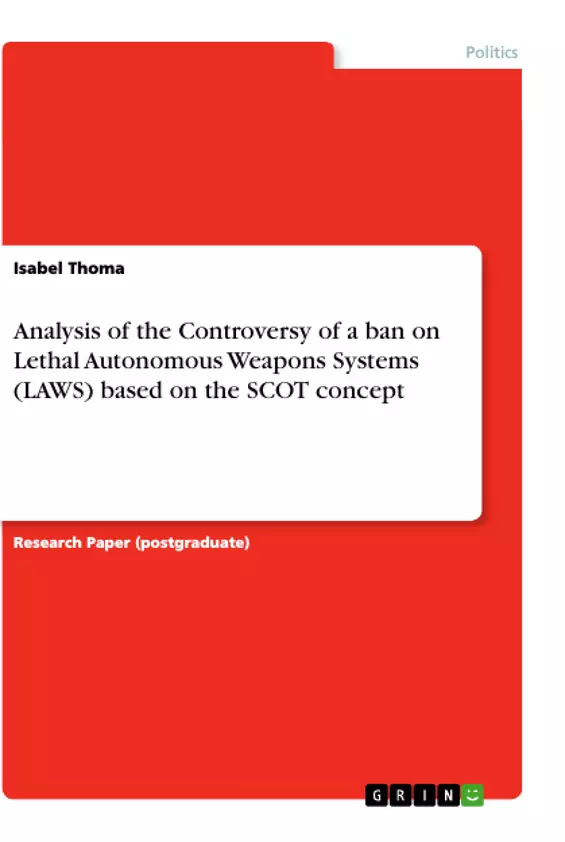The technology of LAWS is discussed controversially: At the political level of states, in international institutions, the scientific field of AI and robotics, the companies working in these fields, the public and the media landscape.
This paper aims to shed light on the question: How is the globally discussed technology of LAWS and its ban perceived by different social groups? Currently, those who are against a ban dominate globally. These are powerful countries that are also leaders in the development of LAWS and refer to the justifications of experts and commercial players.
In the following (Section 2), the controversy of banning LAWS is embedded in the scientific discourse on risk and uncertainty and a selection of the concepts is applied to the technology to not only emphasize the socio-political relevance mentioned in the introduction, but also the academic relevance. Next, the methodological concept of SCOT is introduced theoretically (Section 3) and then applied to the LAWS object of study (Section 4). Finally, the conclusion (Section 5) summarizes the main findings, highlights the limitations of the work, and suggests a way forward.
Inhaltsverzeichnis (Table of Contents)
- Section 1: Introduction
- Section 2: Risk and Uncertainty in STS
- Section 3: Methodological Concept of SCOT
- Section 4: Analysis of the Controversy of a ban on LAWS
Zielsetzung und Themenschwerpunkte (Objectives and Key Themes)
This research paper aims to analyze the controversy surrounding the ban of Lethal Autonomous Weapons Systems (LAWS) through the lens of the Social Construction of Technology (SCOT) concept. The paper investigates how different social groups perceive LAWS and its potential ban, focusing on the dominant position of powerful nations advocating for the technology.
- Risk and Uncertainty in the development and implementation of LAWS
- The role of social groups in shaping the perception and acceptance of LAWS
- The application of the SCOT concept to analyze the controversy surrounding LAWS
- The implications of the controversy for global governance and ethical considerations
- The impact of LAWS on developing nations and the Global South
Zusammenfassung der Kapitel (Chapter Summaries)
- Section 1: Introduction introduces the controversial nature of LAWS technology, highlighting the diverse stakeholders involved in the debate. The section outlines the global reach of the issue and its implications for both developed and developing nations. The paper's focus is on understanding how different social groups perceive LAWS and its potential ban, particularly in the context of the growing global support for a ban.
- Section 2: Risk and Uncertainty in STS explores the concept of risk and uncertainty in the context of technology development. It emphasizes the challenges of managing technological risks, particularly those associated with emerging technologies like LAWS. The section highlights the need for a holistic approach to risk governance, considering the potential ripple and spillover effects of LAWS on various aspects of society.
- Section 3: Methodological Concept of SCOT introduces the Social Construction of Technology (SCOT) concept as a methodological framework for analyzing the controversy surrounding LAWS. SCOT emphasizes the interplay of variation and selection in shaping technological artifacts and their socio-technical contexts. The section outlines the steps involved in applying SCOT to analyze the interpretative flexibility of LAWS and the social groups involved in its development and deployment.
Schlüsselwörter (Keywords)
This research paper focuses on the controversy surrounding Lethal Autonomous Weapons Systems (LAWS), applying the Social Construction of Technology (SCOT) concept to analyze the debate. It investigates the role of risk and uncertainty in the development and governance of LAWS, considering the diverse perspectives of social groups, particularly those in the Global South who are potentially most vulnerable to the technology's impact.
- Citation du texte
- Isabel Thoma (Auteur), 2021, Analysis of the Controversy of a ban on Lethal Autonomous Weapons Systems (LAWS) based on the SCOT concept, Munich, GRIN Verlag, https://www.grin.com/document/1170560



